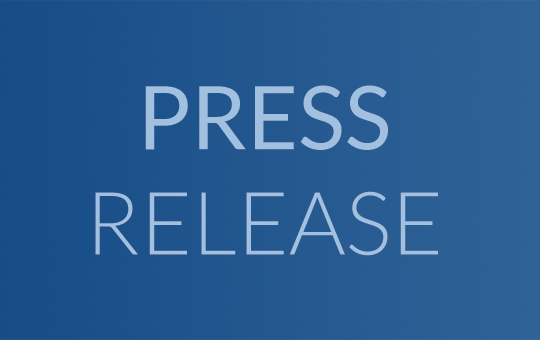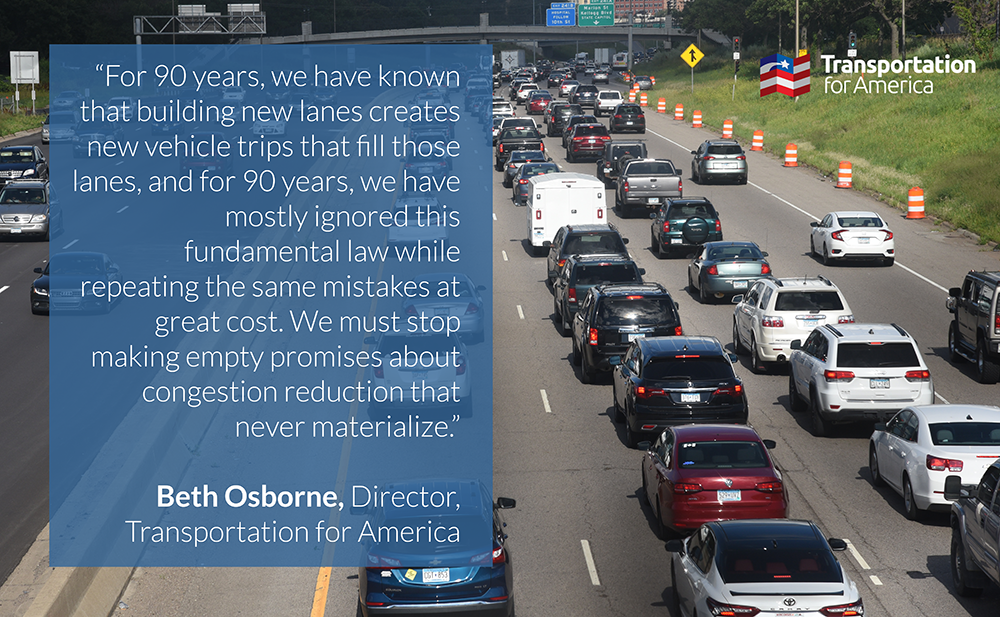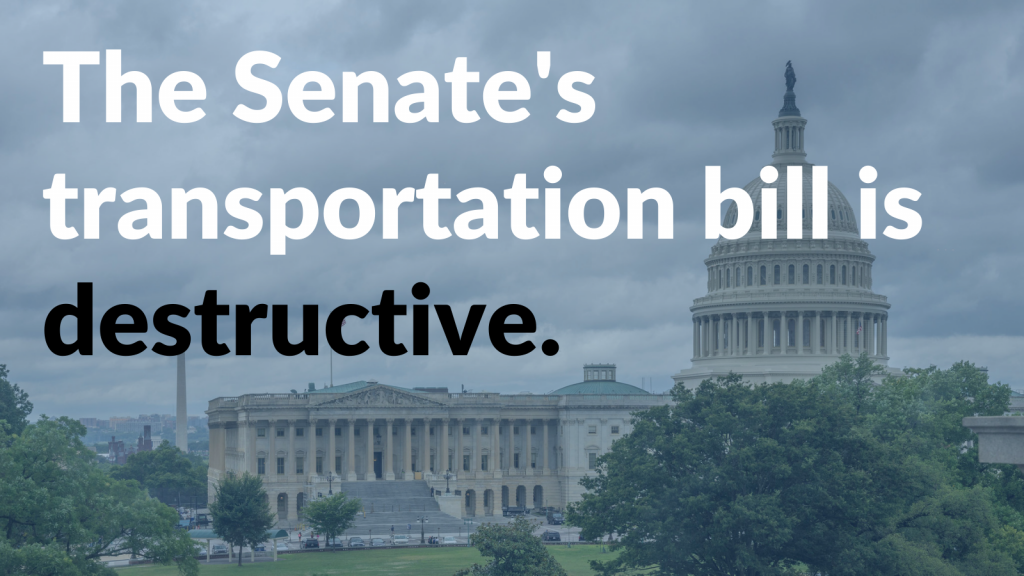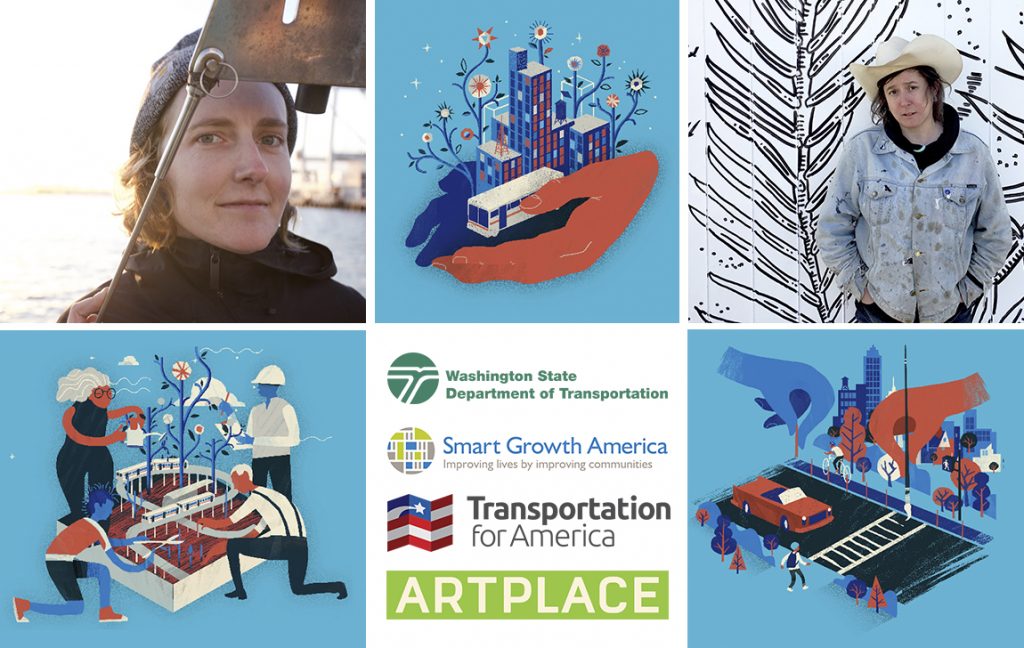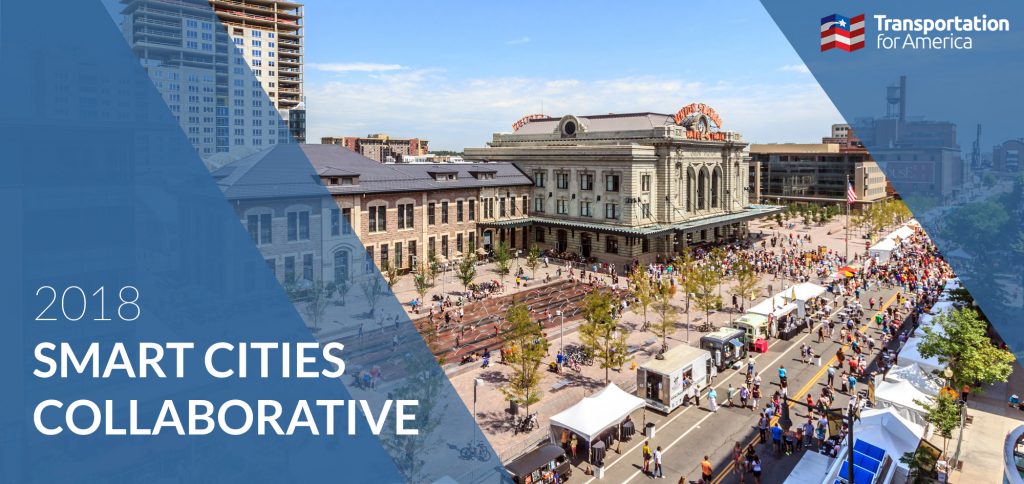With today’s announcement that Kelly Gregory and Mary Welcome have been selected to serve as artists-in-residence with WSDOT for a year, Washington becomes the first state to embed an artist in a statewide agency.
CONTACT: Ben Stone, bstone@smartgrowthamerica.org / 410.370.3843 and Barbara LaBoe, laboeb@wsdot.wa.gov/ 360.705.7080
Artist team Kelly Gregory and Mary Welcome will spend a year working with the Washington State Department of Transportation (WSDOT) as artists-in-residence to bring a creative approach and help develop new ways to achieve agency goals through a first-of-its-kind program created by ArtPlace America and Transportation for America, a program of Smart Growth America.
Recognized as a tool for pioneering innovative and creative solutions, artist-in-residence programs have been piloted across the nation in municipal governmental agencies, but WSDOT will be the first statewide agency to pilot such a program at the state level. These two artists will help find creative ways to advance WSDOT’s strategic plan goals of inclusion, practical solutions and workforce development.
“The quality and quantity of applications we received for the artist-in-residence position impressed our selection committee, and we’re thrilled to have selected the team of Kelly Gregory and Mary Welcome,” said Ben Stone, Smart Growth America’s director of arts & culture. “Their collaborative approach, insatiable curiosity, and experience with design, planning, community engagement, and Washington state make them ideal artists-in-residence. I can’t wait to share their work with other states who are in the process of considering setting up their own similar programs.”
“We’re excited to work with Kelly and Mary to find innovative ways to better engage the communities we serve and deliver the best possible transportation projects,” said Roger Millar, WSDOT’s secretary of transportation. “They have experience with both rural and urban communities that will help us foster deeper community engagement, build relationships with underrepresented communities, and bring creativity to design challenges.”
“This opportunity stood out because it brings together so many of the issues we care about: transportation, infrastructure, community, the rural-urban continuum, and the role of civic service in stewarding the commons,” Gregory and Welcome said. “As artists and activists, we have a history of working in collaboration with non-arts communities and building relational bridges between fun and function. We really believe in the power of artists to bring fresh perspectives and strengthen community connections.”
About the two artists
Mary Welcome, of Palouse, Washington, is a multidisciplinary cultural worker collaborating with complex and often under-represented rural communities, with projects rooted in community engagement and the development of intersectional programming to address hyper-local issues of equity, cultural advocacy, inclusivity, visibility, and imagination. She collaborates to build cooperative environments that encourage civic engagement, radical education, and community progress.
Kelly Gregory is an itinerant social architect based on the Pacific coast. Her practice is rooted in socially-engaged work: affordable housing projects, exhibitions, reimagining spaces of incarceration, democratic public space, and in-depth community-driven research. Her projects fold current communities and future solutions into functional, beautiful spaces for collaboration and engagement. As a team, with a multi-disciplinary backgrounds in arts, outreach, architecture, and activism, they listen with communities and imagine new solutions in collaboration with neighbors.
For more information about the team, read this Q&A between the artists and Transportation for America: https://t4america.org/2019/03/21/get-to-know-washington-states-new-artists-in-residence
What will these artists do?
The residency, based in Olympia, will run for one year with both artists making rotations as a team through several WSDOT core divisions to gain knowledge on the agency’s operations, priorities and challenges. The artist team will then propose projects to address WSDOT’s overarching goals. Their work may address some or all of the following topics: improving community engagement, supporting alternatives to single occupancy vehicle transport, creating healthier communities and enhancing safety and equity. After four months of rotations, eight months will be devoted to the artists’ project(s) development and production.
The artists will begin the residency in July 2019.
More details about the program
Several organizations collaborated on the artist-in-residence program. ArtPlace America is providing a $125,000 grant for the program, including a $40,000 stipend split between the two artists and $25,000 for a final project(s) the artists and staff develop. Transportation for America will administer both the funds and the overall program, including providing staff and consulting assistance. The State Smart Transportation Initiative (SSTI) will also provide staff support. Both T4A and SSTI are programs of Smart Growth America. WSDOT is not providing funding for the program, but will supply in-kind contributions consisting of work space for the selected artists and staff time for agency workers to collaborate on the new program.
###
Transportation for America is an alliance of elected, business, and civic leaders from communities across the country, united to ensure that states and the federal government step up to invest in smart, homegrown, locally-driven transportation solutions — because these are the investments that hold the key to our future economic prosperity. T4America is a program of Smart Growth America. www.t4america.org
The State Smart Transportation Initiative promotes transportation practices that advance environmental sustainability and equitable economic development, while maintaining high standards of governmental efficiency and transparency. It is jointly operated by the University of Wisconsin and Smart Growth America.
ArtPlace America is a ten-year collaboration among a number of foundations, federal agencies, and financial institutions. We began our work as an organization in 2011, and will finish in 2020. Our mission is to position arts and culture as a core sector of community planning and development.
WSDOT keeps people, businesses and the economy moving by operating and improving the state’s transportation systems. To learn more about what we’re doing, go to www.wsdot.wa.gov/news for pictures, videos, news and blogs. Real time traffic information is available at wsdot.com/traffic or by dialing 511.
